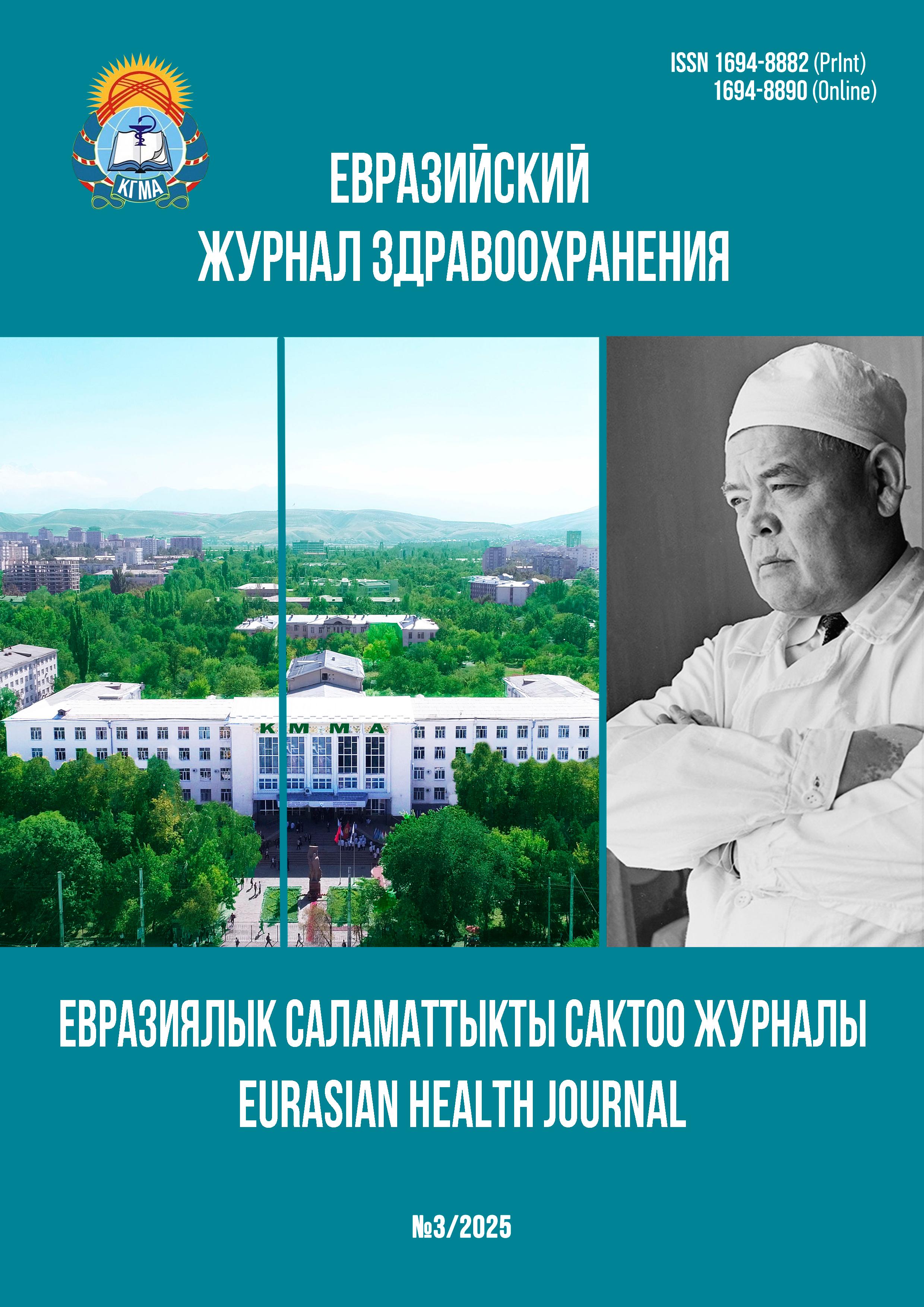CHOLANGIOCARCINOMA (LITERATURE REVIEW)
DOI:
https://doi.org/10.54890/1694-8882-2025-3-155Abstract
Cholangiocarcinoma is one of the most aggressive malignancies of the hepatobiliary system, characterized by poor prognosis and high mortality. The aim of this literature review was to systematize and analyze current data on epidemiology, risk factors, clinical manifestations, diagnostic approaches, and surgical treatment of сholangiocarcinoma, with a focus on identifying unresolved issues and promising directions for further research. The literature search was conducted using the PubMed database. Articles published between 2018 and 2025, primarily in peer-reviewed journals, were included. Selection criteria comprised the presence of clinical or experimental data, methodological and statistical reliability, and availability in English or Russian. The review encompassed original research, meta-analyses, systematic reviews, clinical guidelines, and individual case reports. Despite advances in molecular biology, imaging technologies, and surgical techniques, early diagnosis of сholangiocarcinoma remains challenging, which significantly limits the potential for curative treatment. Currently, surgical resection followed by adjuvant therapy is the only approach capable of providing long-term survival. However, even after radical surgery, recurrence rates remain high, and overall survival outcomes are unsatisfactory. Contemporary research efforts are focused on the identification of novel biomarkers for early detection, refinement of preoperative resectability assessment, and the development of personalized systemic therapies. Particular attention is given to targeted therapy and immunotherapy, which offer promising opportunities to improve oncological outcomes and quality of life for patients. In conclusion, comprehensive investigation of the molecular mechanisms of сholangiocarcinoma carcinogenesis, integration of innovative diagnostic and therapeutic strategies, and strengthening of multidisciplinary collaboration remain key prerequisites for enhancing treatment efficacy and improving prognosis in this patient population.
Keywords:
Cholangiocahcinoma, Klatskin tumor, liver fluke infection (opisthorchiasis), viral hepatitis B, C, jaundice, pancreatoduodenectomy, Whipple’s operationReferences
1. Dar FS, Abbas Z, Ahmed I, et al. National guidelines for the diagnosis and treatment of hilar cholangiocarcinoma. World J Gastroenterol. 2024;30(9):1018-1042. https://doi.org/10.3748/wjg.v30.i9.1018
2. Sarcognato S, Sacchi D, Fassan M, et al. Cholangiocarcinoma. Pathologica. 2021;113(3):158-169. https://doi.org/ 10.32074/1591-951X-252
3. Elvevi A, Laffusa A, Scaravaglio M, et al. Clinical treatment of cholangiocarcinoma: an updated comprehensive review. Ann Hepatol. 2022;27(5):100737. https://doi.org/10.1016/j.aohep.2022.100737
4. Vij M, Puri Y, Rammohan A, et al. Pathological, molecular, and clinical characteristics of cholangiocarcinoma: A comprehensive review. World J Gastrointest Oncol. 2022;14(3):607-627. https://doi.org/10.4251/wjgo.v14.i3.607
5. Gorji L, Beal EW. Surgical Treatment of Distal Cholangiocarcinoma. Curr Oncol. 2022;29(9):6674-6687. Published 2022 Sep 17. https://doi.org/10.3390 /curroncol29090524
6. Banales JM, Marin JJG, Lamarca A, et al. Cholangiocarcinoma 2020: the next horizon in mechanisms and management. Nat Rev Gastroenterol Hepatol. 2020;17(9):557-588. https://doi.org/10.1038/s41575-020-0310-z
7. Brindley PJ, Bachini M, Ilyas SI, et al. Cholangiocarcinoma. Nat Rev Dis Primers. 2021;7(1):65. Published 2021 Sep 9. https://doi.org/10.1038/s41572-021-00300-2
8. Vita F, Olaizola I, Amato F, et al. Heterogeneity of Cholangiocarcinoma Immune Biology. Cells. 2023;12(6):846. Published 2023 Mar 8. https://doi.org/10.3390 /cells12060846
9. Guedj N. Pathology of Cholangiocarcinomas. Curr Oncol. 2022;30(1):370-380. Published 2022 Dec 26. https://doi.org/ 10.3390/curroncol30010030
10. Moris D, Palta M, Kim C, Allen PJ, Morse MA, Lidsky ME. Advances in the treatment of intrahepatic cholangiocarcinoma: An overview of the current and future therapeutic landscape for clinicians. CA Cancer J Clin. 2023;73(2):198-222. https://doi.org/10.3322/caac.21759
11. Lapitz A, Azkargorta M, Milkiewicz P, et al. Liquid biopsy-based protein biomarkers for risk prediction, early diagnosis, and prognostication of cholangiocarcinoma. J Hepatol. 2023;79(1):93-108. https://doi.org/10.1016/ j.jhep. 2023.02.027
12. Rushbrook SM, Kendall TJ, Zen Y, et al. British Society of Gastroenterology guidelines for the diagnosis and management of cholangiocarcinoma. Gut. 2023;73(1):16-46. Published 2023 Dec 7. https://doi.org/10.1136/gutjnl-2023-330029
13. Elias C, Rahman A, Mial-Anthony J, et al. Advancements in cholangiocarcinoma: evolving strategies for diagnosis, treatment, and palliation over three decades. Chin Clin Oncol. 2024;13(5):70. https://doi.org/10.21037/cco-23-144
14. Ferrante ND, Hubbard RA, Weinfurtner K, et al. Validity of Diagnostic Codes and Laboratory Tests to Identify Cholangiocarcinoma and Its Subtypes. Pharmacoepidemiol Drug Saf. 2025;34(5):e70154. https://doi.org/10.1002/pds.70154
15. Hewitt DB, Brown ZJ, Pawlik TM. Surgical management of intrahepatic cholangiocarcinoma. Expert Rev Anticancer Ther. 2022;22(1):27-38. https://doi.org/10.1080/14737140.2022.1999809
16. DeOliveira ML, Cunningham SC, Cameron JL, et al. Cholangiocarcinoma: thirty-one-year experience with 564 patients at a single institution. Ann Surg. 2007;245(5):755-762. https://doi.org/10.1097/01.sla.0000251366.62632.d3
17. Dickson PV, Behrman SW. Distal cholangiocarcinoma. Surg Clin North Am. 2014;94(2):325-342. https://doi.org/10.1016/j.suc.2013.12.004
18. Kendall T, Verheij J, Gaudio E, et al. Anatomical, histomorphological and molecular classification of cholangiocarcinoma. Liver Int. 2019;39 Suppl 1:7-18. https://doi.org/10.1111/liv.14093
19. Madkhali AA, Al-alem F. Distal Cholangiocarcinoma. In: Rodrigo L, ed. Bile Dust Cancer. IntechOpen; 2019. https://doi.org/10.5772/intechopen.84625
20. Zhou Y, Liu S, Wu L, Wan T. Survival after surgical resection of distal cholangiocarcinoma: A systematic review and meta-analysis of prognostic factors. Asian J Surg. 2017;40(2):129-138. https://doi.org/10.1016/j.asjsur.2015.07.002
21. Ishii T, Iwaki K, Nakakura A, Yoh T, Uchida Y, Hatano E. Is routine lymph node dissection recommended for liver resection of intrahepatic cholangiocarcinoma? A systematic review and meta-analysis. HPB (Oxford). 2024;26(6):731-740. https://doi.org/10.1016/j.hpb.2024.03.1163
22. Zhang R, Tan Y, Liu M, Wang L. Lymph node metastasis of intrahepatic cholangiocarcinoma: the present and prospect of detection and dissection. Eur J Gastroenterol Hepatol. 2024;36(12):1359-1369. https://doi.org/10.1097/ MEG.0000000000002856
23. Melandro F, Nasto RA, Ginesini M, et al. A narrative review of intrahepatic cholangiocarcinoma: a surgical curative option. Chin Clin Oncol. 2023;12(2):13. https://doi.org/10.21037/cco-22-85
24. Zhu J, Liu C, Li H, et al. Adequate lymph node dissection is essential for accurate nodal staging in intrahepatic cholangiocarcinoma: A population-based study. Cancer Med. 2023;12(7):8184-8198. https://doi.org/10.1002/cam4.5620







